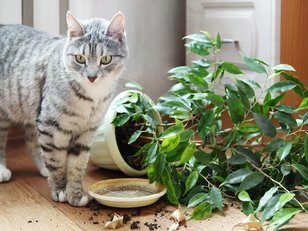
A cat-proofed home is a cat-safe home whether your new pet is a newborn kitten or a fully- grown cat. Before that first front paw crosses your threshold for the first time, your home must be a health zone, not a hazard zone. Be especially attentive to the sensibilities of former “outside” cats, who may never have walked on wooden floors, carpets or tiles, or been exposed to so many unfamiliar sights before.
Begin the process of cat-proofing by walking through your home, room by room, searching for things a kitten or cat might climb, knock over or pull down, and either secure, remove or store them. Keep all trashcans behind closed and latched doors and wastebaskets (covered if possible) out of sight. Ensure that all heating/air vents have covers. Snap specially designed plastic caps over electrical outlets. Tie electrical cords together and tuck them out of reach.
Install childproof latches to keep inquisitive paws from prying open cabinet doors in kitchens and bathrooms, and ALWAYS keep toilet lids down. In bedrooms, keep all medications, lotions and cosmetics off accessible surfaces such as bedside tables. Store collections – from buttons and coins to marbles and potpourri – on high shelves, and keep breakables on low surfaces to a minimum.
Most chemicals are hazardous to kittens and cats and should be replaced if possible with non-toxic products. A partial list includes: antifreeze, bleach, drain cleaner, household cleaners and detergents, glue, nail polish and polish remover, paint, varnish and sealants, pesticides and rat poison.
Many indoor plants, however pretty, can prove poisonous to kittens and cats that are, by nature, explorers, climbers and lickers. A partial list of these plants includes: amaryllis, azaleas and rhododendrons, chrysanthemum, cyclamen, kalanchoe, lilies, oleander, peace lily, pothos, Sago palm, tulip and narcissus bulbs, and yew.
Seemingly harmless “people” food can often be lethal for kittens and cats. These include alcoholic beverages, bones from fish or poultry, canned “people” tuna, chocolate, grapes and raisins, liver (in large amounts), macadamia nuts, milk, mushrooms, onions and garlic, potato, rhubarb and tomato leaves and stems, raw eggs and fish, and yeast dough.
Although prevention is the key to your new pet’s wellbeing, accidents can and do happen. The truly protective pet parents are prepared pet parents and know to keep a list of vital numbers handy:
- Veterinarian
- 24-hour veterinary emergency clinic
- ASPCA Poison Control: 888-426-4435
- Pet Poison Help Line: 800-213-6680
Hopefully, these are numbers you’ll never use. And as long as you remain vigilant, both you and your new, best furry friend can rest, assured.









 RSS Feed
RSS Feed